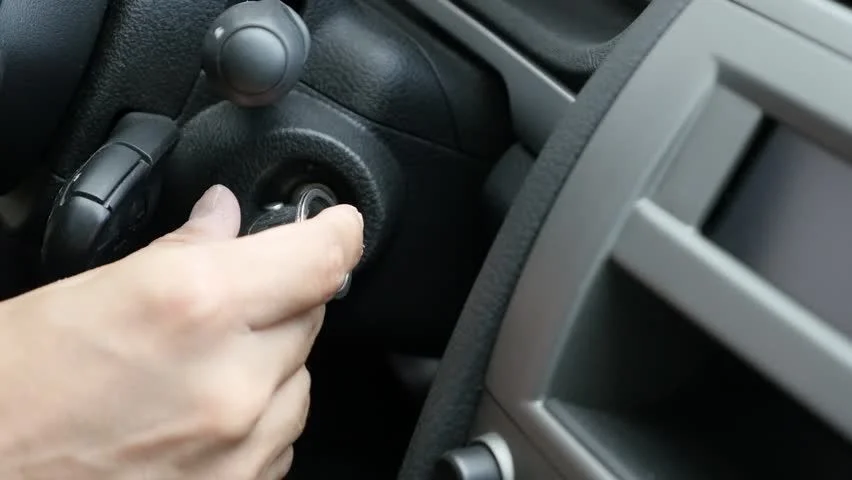If your car won’t start, don’t panic! It can be frustrating when your car won’t turn over, but there are a few things you can do to help get it running again.
In this blog post, we’ll walk you through some of the most common causes of why a car won’t turn over and what you can do about it.
Dead Battery
When a car won’t turn over, one of the most common reasons is a dead battery. If you have a battery tester that can measure cranking amps, use it to see if the battery is weak. If the light goes out, it’s a sign the battery is really weak—almost dead.
To heat up the battery, terminals, and starter, try the key cycling technique.
If your car won’t start due to a dead battery, calling for a tow and getting to a repair shop right away is your best option.
Bad Battery Connection
If the battery is weak, but not totally dead, the starter may be struggling to turn over the engine. This could be caused by bad or corroded battery connections.
Corroded connections can stop electricity from getting to the starter motor, making it work harder and fail in the end. Check all of your battery connections, making sure they’re clean, tight, and free from corrosion.
You may need to replace any damaged cables or terminals.
If the connections are all in good condition, it could be that your alternator is failing and not charging the battery properly.
Insufficient Compression
If the car won’t turn over, there may be insufficient compression in the cylinders. This could be a result of worn piston rings, which would also cause excessive blow-by. You could also have worn valve seals, had air leaks, or had a problem with the timing belt.
It’s important to check all these components in order to ensure that your car is running safely and efficiently.
Problem with the Key Fob
If your vehicle makes a sound like it is turning over, but then fails to start, it might be a problem with the key fob, like a bad transponder or a dead battery.
It could also be that your car’s own security system stops the engine from starting—if the immobilizer fails to recognize your key, then your engine won’t turn over.
In such cases, you should replace the key fob battery or call for a tow and get to a repair shop right away.
Worn Starter Motor
The starter motor can also be the root cause of why the car won’t turn over. A worn starter motor can lead to problems with the cranking of the engine, which will prevent it from starting.
It is important to have your starter motor checked if you suspect that it may be causing an issue. If it is found to be worn out, then it will need to be replaced in order to get your car up and running again.
Faulty Ignition Switch
The faulty ignition switch is one of the most common causes of why your car won’t turn over. It’s the part of your car that sends signals to the starter motor and other electrical components, and when it fails, it can prevent your engine from starting.
You can tell if the ignition switch needs to be replaced if you experience difficulty turning the key, or if your car won’t start at all.

Clogged Fuel Filter
If your car won’t start after checking for all the issues mentioned above, it could be due to a clogged fuel filter. This is likely the result of sediment buildup in the filter, which can prevent enough fuel from reaching the engine.
If this is the case, then you’ll need to replace the filter in order to get your car running again.
Low Fuel Pressure
If you’ve ruled out all the other potential causes of why your car won’t turn over, then it may be due to low fuel pressure.
Low fuel pressure can be caused by a variety of factors such as a faulty fuel pump, clogged fuel filter, or incorrect tank venting. When this happens, the car’s fuel injection system can’t deliver the right amount of fuel to the engine, resulting in difficulty starting your car.
You’ll have to test your fuel pressure to determine the cause of a dying fuel pump. You can buy a fuel pressure gauge at any auto parts store and use it to measure your vehicle’s current levels.
If the pressure is lower than the specification, then you’ll need to identify and fix the problem before you can get back on the road.
Wrong Fuel Mixture
Misfuelling your car can be a costly mistake if you try to drive it, but here’s what to do if you put petrol in your diesel. When petrol is added to diesel the mixture acts like a solvent, dissolving the lubricant. Switching on your ignition circulates the mixture and can cause serious damage to your engine, as well as other components like the fuel injectors.
Once clogged, the fuel injectors may not add the correct amount of fuel to the cylinders, and the vehicle may not start up at all.
If you have misfueled your car and it won’t turn over, it’s best to seek professional help to avoid further damage.
Clogged Exhaust System
The last possible cause of a car not starting is a clogged exhaust system. This is because of a clogged catalytic converter or a melted one from a cylinder misfire. It will run and start, but not rev, due to exhaust back pressure.
This metal canister is full of a chemical catalyst that “converts” gas emissions in your exhaust system so that they are either lessened or gone completely.
If you suspect your exhaust system is the culprit, it’s best to get it checked by an experienced mechanic to make sure it’s running properly.

Chris Miller is an auto journalist who specializes in reviewing new cars and providing helpful advice on family vehicles. He has a passion for cars and enjoys sharing his knowledge and expertise with others.





